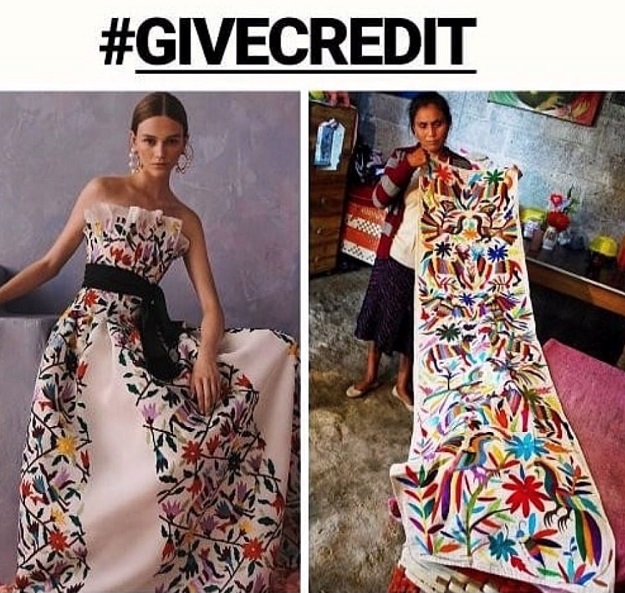The debate on cultural appropriation and racism in the fashion industry has reached a fevered pitch affecting the local indigenous tribe of farmers, Otomi. Otomis are the creators of the world-renown Mexican Maria dolls and their fantasy-filled brightly colored embroidery.
On Wednesday, June 12, a letter was published by the minister of Mexican Culture, Alejandra Frausto, sent to the fashion house Carolina Herrera. The Minister of Culture accuses the design group of using, solely for their own benefit, embroidery techniques and patterns of indigenous communities for the Resort 2020 collection.

The Resort 2020 collection was inspired by the lifestyle of the founder of the fashion house, who is Venezuelan, and Carolina Herrara’s idea of what a “Latin American vacation” would be like.
The collection includes dresses featuring floral and animal embroidery that Mexico’s Minister of Culture wrote belong to the Otomí community.
This is the first time that a national government is directly involved in cultural appropriation for dresses. The minister feels the frocks were created without permission, respect, or economic retribution for the Otomi communities that produced the recognizable patterns.

Carolina Herrera, nor her brand, has given a public response nor has it divulged any public apology or plans to pay the people whose embroidery was used. Instead the design house indicated that the collection was always intended to pay tribute to Mexico and to celebrate it. However, is the tribute really simply theft? Should the design house be required to work with the Otomis, and not just borrow ideas from them in a pursuit of profit?
The multi-colored embroidery on the dresses in question are worn by the indigenous Mexicans as canvases, or codices, where they capture abstractions of reality, representing their personal, family and community customs.
The Carolina Herrera brand insists: “All the prints are designed in-house. It’s a labor of love”.

The Mexican government claims the designs are being used in an inappropriate way and demands that the brand “publicly explain on what basis it decided to make use of these cultural elements, whose origins are documented, and how this benefits the [Otomi] communities.”
As anyone who has met me can attest, I’m not a fashion icon, but I found the Herrara issue interesting as I’m about to launch a social media campaign to draw more attention to local business and the Otomi -made Maria dolls.
The big differences are I always refer to the dolls as Otomi-made and explain their history daily on tours and in the press. Plus my project of placing Maria dolls in businesses reflective of the business (For example, a vet Maria features dogs and cats, or a chocolate shop with Maria making bon-bons) has no money involved. Well, just mine, in buying the dolls and promoting them.
Still, it was after I placed the dolls on six best-selling books in the San Miguel de Allende Secrets series, I’ve notice they are riding an unrelated cultural tidal wave of popularity.
The Maria doll zeitgeist has the ladies on tees, purses, dresses, cell phone covers and most any fashion option. I suppose the big difference with the dolls is none of the options are sponsored by a major design house claiming the doll is their creation.
Bet Barbie, and her German sex doll past, never had to battle out her pretty in pink image on flip flops! Then again, she probably has. Fashion dolls, like fashion itself, is a tough business and one must tread lightly when “borrowing” someone else’s best work.
Joseph Toone is the Historical Society’s short-story award winning author of the SMA Secrets book series. All books in the series are Amazon bestsellers in Mexican Travel and Holidays.
Toone is SMA’s expert and TripAdvisor’s top ranked historical tour guide telling the stories behind what we do in today’s SMA. Visit HistoryAndCultureWalkingTours.com, and JosephTooneTours.com.

